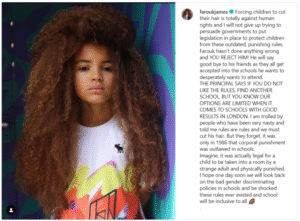In London, a mother named Bonnie Miller is making headlines for challenging school regulations she believes discriminate against her 8-year-old son, Farouk James. The young boy, known for his striking long hair and budding career as a child model, has been turned away from multiple schools because of rules that prohibit boys from wearing their hair long. For Bonnie, the issue has become much larger than school admissions—it is about identity, heritage, and fairness.
Farouk’s father is Ghanaian, and the family followed a cultural tradition of waiting until Farouk was three years old before cutting his hair for the first time. Since then, Farouk’s hair has grown into thick, flowing locks that have become part of who he is. Modeling agencies from around the world have expressed interest in him, with his unique look helping him stand out in the competitive industry. Yet, despite this recognition, some UK schools have denied him entry, citing strict policies on boys’ hair length.
For Bonnie, these policies are deeply problematic. She argues that they not only limit children’s freedom of expression but also reinforce outdated standards that fail to respect cultural and personal identity. To fight back, she launched a campaign called Mane Generation on Change.org, calling for reforms to school grooming rules in the UK and beyond. Her petition highlights how hair-related rules often disproportionately affect children from ethnic backgrounds, particularly those with Afro-textured hair, dreadlocks, or braids.
Farouk’s story has gained wide attention, thanks in part to his strong online presence. His Instagram account, managed by Bonnie, has attracted thousands of followers and supporters who view him as a symbol of individuality and cultural pride. However, not all responses have been positive. Alongside admiration and encouragement, Bonnie and Farouk have faced criticism from those who insist rules are rules and should be followed. Bonnie remains resolute, saying she will not compromise her son’s identity or cut his hair just to make him fit into rigid systems.
Hair has long been a contentious issue in schools. Across the UK and other countries, children with certain hairstyles have been punished or excluded, sparking accusations of racial and cultural discrimination. Critics argue that such policies unfairly target Black and mixed-heritage children, whose hair textures and traditions often do not align with Eurocentric standards. For families like Farouk’s, the consequences go beyond inconvenience—they send a harmful message that a child’s natural appearance is unacceptable.
Bonnie’s campaign is about more than just her son’s schooling. She is advocating for a broader shift in how institutions view hair, urging schools to create inclusive environments that celebrate diversity rather than suppress it. “Children should be free to be themselves,” she has said, emphasizing that no child should have to choose between their education and their identity. Whether or not the Mane Generation movement succeeds in changing national policy, Bonnie and Farouk have already brought international awareness to the issue of hair prejudice, shining a light on the need for fairness, respect, and cultural understanding in classrooms everywhere.






